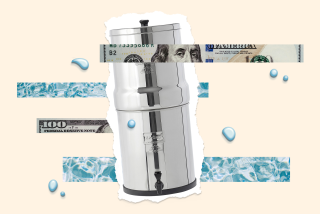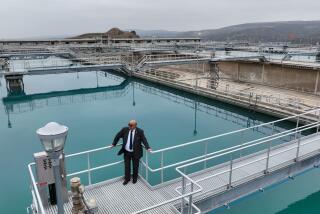Idea Was Good, Timing Right--Now What?
- Share via
Founder Richard Heckmann and his company, U.S. Filter Corp., are in many ways a business tale for our times. From a standing start seven years ago, U.S. Filter acquired more than 50 companies in water treatment services and equipment, and now manages the water systems of 85 major corporations and 120 municipalities in the United States and abroad.
It has grown from $17 million in sales in 1990 to more than $2 billion in the fiscal year ended March 31.
How has it grown so fast?
“That’s the marvel of the bull market,” says Heckmann. “I don’t know that this could have been done 10 years ago or could be done 10 years from now. We caught a market here that loves consolidation and loves growth stories, a market that went: ‘Water! Of course! How did we miss that?’ ”
What Heckmann means is that the professional investors who make up the stock market gave U.S. Filter a premium stock price--it sells at 46 times earnings per share now. They did so because they shared his vision that a big company could reap opportunities in the growing and changing $300-billion worldwide market for water treatment and purification.
Heckmann then used the highly valued stock to acquire smaller companies that manufacture filters and valves and pumps, along with water treatment divisions of large corporations such as Aluminum Co. of America and WMX Technologies Inc. U.S. Filter also used the stock to back $245 million in convertible bonds, securing an effective interest rate of roughly 5.5% for its long-term debt, quite low for a young, aggressive company.
Now, having used finance adroitly, U.S. Filter is faced with a challenge--one that may be faced by many high-flying growth companies if the bull market continues to fizzle: Can it produce real gains in revenue and earnings by improving operations year in, year out?
In other words, can U.S. Filter make 10,000 employees in 360 offices and 42 manufacturing plants worldwide work as a united company rather than as merely a collection of the 55 companies it acquired?
On that question alone the company makes an interesting study. But U.S. Filter’s rise is also worth study because it reflects the changing world of water, which is going up in price as towns and cities are faced with repairing deteriorating water systems. Also, around the world, many countries are getting safe drinking water for the first time. And industries from soft drinks to semiconductors find increasing needs for purified water and for protection from liability in discharging waste water.
“The cry used to be ‘Dilution is the solution to pollution’--if you put waste material into a big enough body of water, it goes away,” says Heckmann. “But now we know nothing goes away, and so water treatment has to be improved and monitored by a company large enough to handle the responsibility and potential liability.”
It was with that business vision that Heckmann, now 53--a onetime insurance salesman, entrepreneurial company owner, Carter administration appointee and stockbroker--persuaded half a dozen friends to join him in putting up $1.6 million in 1989.
Among the friends were economist and investment manager Arthur Laffer, a onetime professor at USC and Pepperdine University and a key influence in the Reagan administration, and Alfred Osborne Jr., head of the entrepreneurial studies center at UCLA’s graduate school of management and a director of several companies, including Times Mirror Co., owner of the Los Angeles Times.
The friends used the $1.6 million to acquire American Toxic Waste Co. in Whittier, renamed it U.S. Filter, moved it to Palm Desert, Heckmann’s home, and turned losses into profits. In 1991, Sutro & Co., the California investment banking firm, floated a $23-million stock offering for U.S. Filter. Six more stock offerings have followed as the bull market welcomed the concept.
In 1992, U.S. Filter acquired the water treatment divisions of Alcoa--$100 million worth of filtration and treatment systems that expanded the company’s customer base. “It was a big break,” says Osborne.
The Alcoa divisions were unprofitable, but U.S. Filter turned them around. “We stripped away the corporate overburden,” Osborne says, outlining a belief in entrepreneurial initiative as a cure for big-company blues.
In every company, there are “pockets of talent,” he says. “But they are disenfranchised--their ideas are ignored and they are not rewarded.” So U.S. Filter encouraged new thinking and put incentives into compensation. “If people succeed they’re rewarded; if not, they can leave,” Osborne says.
As U.S. Filter has grown, it has shifted from sales of equipment to full-service water treatment with guarantees. “You give us specifications of the water quality you need and we’ll supply it. And every gallon that doesn’t meet spec, you don’t pay for,” says Heckmann, a native of Des Moines, who earned a political science degree in the 1960s from the University of Hawaii. He adds, “I was not what you’d call a serious student.”
Maybe not, but his idea of building a company by knitting together equipment suppliers was a shrewd one. It allowed U.S. Filter to secure a base of customers to whom Heckmann could then say, “We already work for you, so let us do a little more.”
The risk is great. If the company cannot manage its far-flung operations, it could run into trouble on its guarantees. It could run into money trouble--rapid growth by acquisition has meant that profits as a return on shareholders’ investment remain low so far.
Yet the opportunity is enormous. According to the Environmental Protection Agency, U.S. cities must spend $135 billion to upgrade and repair their water systems. Big cities such as Los Angeles, Atlanta and Boston face major expenditures and tax and ratepayers not eager to pony up more money. Privatization of water services will be a trend, and U.S. Filter’s services will be in demand. Analyst Marc Sulam of Donaldson Lufkin & Jenrette predicts that U.S. Filter will grow 25% a year.
Outside the U.S., where Heckmann’s company gets one-third of its revenue, the water treatment business is opening up, particularly in Mexico, China, India and Indonesia. “It’s a company doing good in the world and it’s exciting,” says Laffer, whose U.S. Filter stock and options are now worth $2 million. (Heckmann’s are worth more than $21 million.)
Yes, but the sputtering of the bull market--as on Friday, when the Dow Jones industrial average fell 148 points and U.S. Filter closed down 37.5 cents at $30.125--is likely to make life even more exciting for this and many other companies.
More to Read
Inside the business of entertainment
The Wide Shot brings you news, analysis and insights on everything from streaming wars to production — and what it all means for the future.
You may occasionally receive promotional content from the Los Angeles Times.










